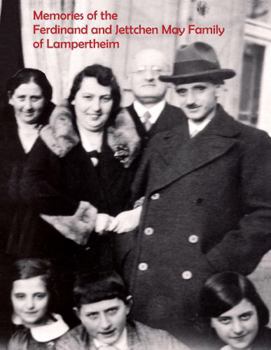Memories of the Ferdinand and Jettchen May Family of Lampertheim: Reclaiming Our German Heritage Eighty Years after the Holocaust
Lore May was born in 1920 in Lampertheim, a small town in southwest Germany. Her father was a successful Jewish merchant whose family had lived in Lampertheim for more than 300 years. At the age of ten, Lore began traveling by train to school in the historic town of Worms and later in Mannheim. Rebellious by nature, Lore entered her teens just as the Nazi regime came to power. She was unable to bear the discrimination against Jewish children at school and quit at the age of fifteen. Constantly in trouble with the Nazi authorities, Lore escaped from Germany and immigrated to the United States in 1938, when she was seventeen.
Despite never finishing high school, and with a limited knowledge of English, Lore graduated from the University of Illinois in two years, fulfilled her goal of becoming a teacher of teachers, and developed a world-famous mathematics curriculum for children. Motivated by her own experiences in Nazi Germany, Lore dedicated her adult life to education and social justice. When she and her husband Donald Rasmussen died, they left a roomful of correspondence, documents, and photos to their three sons.
Memories of the Ferdinand and Jettchen May Family of Lampertheim is the story of Lore and eleven generations of the May family, carefully reconstructed by her sons Peter, David, and Steven Rasmussen. Included are remembrances of life under the Nazis by Lore, her father Ludwig, her siblings Erna and Werner, and the "Aryanization" of Ludwig's department store Kaufhaus May. Lore's "lucky" relatives escaped the Holocaust by emigrating to distant countries, where they could attempt to rebuild their lives, while others, including Lore's favorite uncle, Josef, were murdered in Nazi death camps. By the end of the Holocaust, no Jews remained in Lampertheim.
Memories ends on a positive note, with fifteen members from three generations of the May family receiving German citizenship and twenty family members returning to Lampertheim to honor their ancestors and reclaim their lost heritage at a Stolpersteine ceremony planned by the town. Elderly Lampertheimers embraced the visiting May family and related passed-down stories of times before the Holocaust when the town's Jews and gentiles lived in harmony.
With 200 photos and illustrations, Memories can serve as a model for others desiring to share their family stories with future generations. Lessons gained from the May family's experiences are very relevant in today's fractured world.





